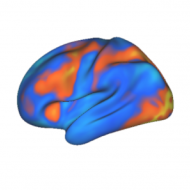 Several months ago I posted The Will to be Free, Part I. In that post I explained that memory is the key to free will. However, this insight isn’t quite satisfactory. We need three additional things to complete the picture: the ability to choose based on predictions, internal desires, and self-awareness. (A quick disclaimer: These ideas are all extremely speculative. I’ll probably test most of them at some point, but right now I’m just putting them out there to hopefully allow for refinement of these hypotheses.) First, the ability to choose based on predictions. As mentioned last time, free will comes down to decision making. Specifically it comes down to our ability to make a decision based on internal sources (or at least condoned by them), rather than external coercive forces. If we cannot predict the outcome of our decision with any certainty, then decision making is pointless. For instance, if no matter what I choose to order at dinner a random dish is served then I had no freedom to choose in the first place. Thus, our ability to predict is necessary for free will. What are these “internal sources” involved in decision making that I mentioned earlier? They are the second new idea needed to complete our picture of free will: desires. We might describe desires as semantic representations corresponding to states in the external environment that the desiring individual tends to act toward. This process likely occurs via sustained neural firing of these semantic representations and the corresponding biasing of decisions toward their instantiation in reality. For instance, if I desire a hamburger over a hot dog the hamburger will seem more salient because of the increased neural firing for that representation. Without desires there would also be no point to decision making. All predicted outcomes would seem equally bland, and all decisions would be pointless. So, we have memory, desires, and the ability to predict as key components to free will. These allow us to have a self with history (memory), that hopes for (desires) certain (predicted) outcomes and makes decisions accordingly. This seems quite satisfactory, except that even simple organisms that likely lack will (free or not) have memory, rudimentary desires, and the ability to predict. A famous example is the sea slug aplysia, which can learn (memory) to shoot ink (in the desire for survival) in response to a conditioned stimulus (used to predict a perceived threat). One thing that really sets us humans apart from organisms like aplysia is our ability to be self-aware, and to modify ourselves based on that awareness. Using self-awareness we can modify ourselves. We can observe the outcome of our decisions to improve our ability to predict next time and, most importantly, to change the very desires which instantiated those decisions. This paints a very dynamic picture of the will. Memories of self and past outcomes converge on particular desires and predicted outcomes, which leads to a decision. These outcomes are then fed back into modifications of self, the ability to predict next time, and what is desired. This feedback loop is essential for free will, since it can free us from the immediate environment and our genetically programmed tendencies. The force of this feedback loop is largely independent of these two deterministic forces in our lives. -MC
Several months ago I posted The Will to be Free, Part I. In that post I explained that memory is the key to free will. However, this insight isn’t quite satisfactory. We need three additional things to complete the picture: the ability to choose based on predictions, internal desires, and self-awareness. (A quick disclaimer: These ideas are all extremely speculative. I’ll probably test most of them at some point, but right now I’m just putting them out there to hopefully allow for refinement of these hypotheses.) First, the ability to choose based on predictions. As mentioned last time, free will comes down to decision making. Specifically it comes down to our ability to make a decision based on internal sources (or at least condoned by them), rather than external coercive forces. If we cannot predict the outcome of our decision with any certainty, then decision making is pointless. For instance, if no matter what I choose to order at dinner a random dish is served then I had no freedom to choose in the first place. Thus, our ability to predict is necessary for free will. What are these “internal sources” involved in decision making that I mentioned earlier? They are the second new idea needed to complete our picture of free will: desires. We might describe desires as semantic representations corresponding to states in the external environment that the desiring individual tends to act toward. This process likely occurs via sustained neural firing of these semantic representations and the corresponding biasing of decisions toward their instantiation in reality. For instance, if I desire a hamburger over a hot dog the hamburger will seem more salient because of the increased neural firing for that representation. Without desires there would also be no point to decision making. All predicted outcomes would seem equally bland, and all decisions would be pointless. So, we have memory, desires, and the ability to predict as key components to free will. These allow us to have a self with history (memory), that hopes for (desires) certain (predicted) outcomes and makes decisions accordingly. This seems quite satisfactory, except that even simple organisms that likely lack will (free or not) have memory, rudimentary desires, and the ability to predict. A famous example is the sea slug aplysia, which can learn (memory) to shoot ink (in the desire for survival) in response to a conditioned stimulus (used to predict a perceived threat). One thing that really sets us humans apart from organisms like aplysia is our ability to be self-aware, and to modify ourselves based on that awareness. Using self-awareness we can modify ourselves. We can observe the outcome of our decisions to improve our ability to predict next time and, most importantly, to change the very desires which instantiated those decisions. This paints a very dynamic picture of the will. Memories of self and past outcomes converge on particular desires and predicted outcomes, which leads to a decision. These outcomes are then fed back into modifications of self, the ability to predict next time, and what is desired. This feedback loop is essential for free will, since it can free us from the immediate environment and our genetically programmed tendencies. The force of this feedback loop is largely independent of these two deterministic forces in our lives. -MC
Leave a comment

In a universe of one-way time and no do-overs, at least from our perspective, I see no possibility of demonstrating either free will or determinism – which I think is why this has been debated for centuries.
I wonder, though, if we could always accurately predict what someone was going to do before they did it, wouldn’t this prove determinism? It would be strong evidence for determinism at the very least.
I suppose I’m a compatiblist regarding free will and determinism. Even if I could always predict a person’s next action I would still consider him/her as having free will (as long as those actions weren’t strongly coerced by another individual). I don’t think free will and determinism are polar opposites.
A problem with using self-awareness to salvage free will is that some evidence suggests that we, in fact, become self-aware of some decisions only after they are made.
http://www.mpg.de/english/illustrationsDocumentation/documentation/pressReleases/2008/pressRelease20080414/
A possible problem with such a study, though, could be instrumental sensitivity.